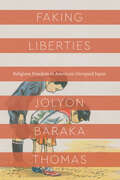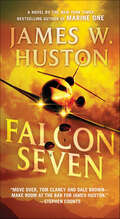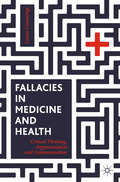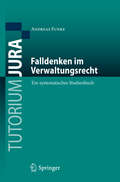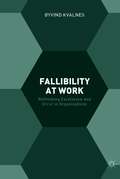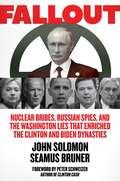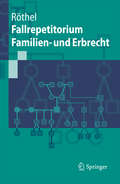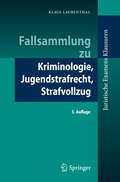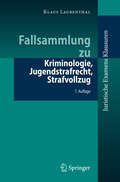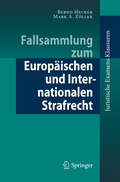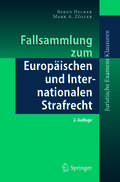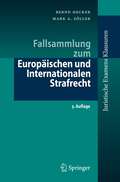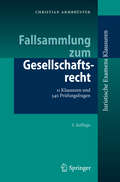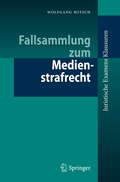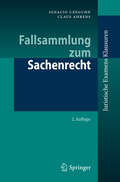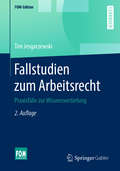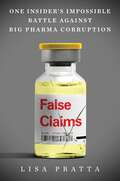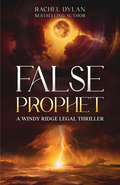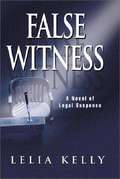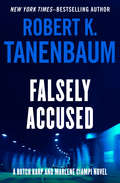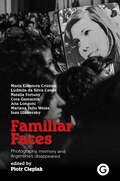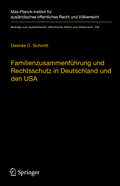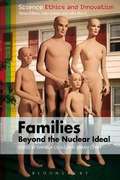- Table View
- List View
Faking Liberties: Religious Freedom in American-Occupied Japan (Class 200: New Studies in Religion)
by Jolyon Baraka ThomasReligious freedom is a founding tenet of the United States, and it has frequently been used to justify policies towards other nations. Such was the case in 1945 when Americans occupied Japan following World War II. Though the Japanese constitution had guaranteed freedom of religion since 1889, the United States declared that protection faulty, and when the occupation ended in 1952, they claimed to have successfully replaced it with “real” religious freedom. Through a fresh analysis of pre-war Japanese law, Jolyon Baraka Thomas demonstrates that the occupiers’ triumphant narrative obscured salient Japanese political debates about religious freedom. Indeed, Thomas reveals that American occupiers also vehemently disagreed about the topic. By reconstructing these vibrant debates, Faking Liberties unsettles any notion of American authorship and imposition of religious freedom. Instead, Thomas shows that, during the Occupation, a dialogue about freedom of religion ensued that constructed a new global set of political norms that continue to form policies today.
Falcon Seven: A Novel
by James W. HustonNew York Times bestselling author James W. Huston returns with his most powerful thriller to date. Exploding with international intrigue, sizzling courtroom drama, and heart-stopping action, Falcon Seven delivers an all-too-realistic tale of America under fire.A U.S. Navy F/A-18 flying over Afghanistan is suddenly diverted and ordered to bomb a building in Pakistan, where a meeting between al Qaeda and the Taliban is taking place. After destroying their target, the fighter jet is immediately hit by Stinger missiles and the pilots eject over Pakistan. They are captured, assaulted, and dragged through the streets of Peshawar. The world is on edge.The fliers are quickly forced onto a secret Falcon jet headed for the Netherlands, where they'll stand trial for war crimes at the International Criminal Court. The building they hit was actually a medical post constructed by Europeans for Afghan refugees---and sixty-five innocent people were killed.It's up to Washington criminal defense lawyer and former Navy SEAL Jack Caskey to defend the two navy officers and get to the bottom on what is beginning to seem like an orchestrated event. The National Security Council pushes President Obama to employ the act passed under George W. Bush that authorizes the use of force to extract Americans held by the International Criminal Court. While the president initially approves a special operations team to grab the Americans, he later withdraws to cooperate with the ICC. Already fighting a losing battle for his clients, an outraged Caskey works with his contacts in the shadowy world of special operations and CIA operatives to free his clients himself . . . or help them battle through an international show trial and face imprisonment---for life.
Fallacies in Medicine and Health: Critical Thinking, Argumentation and Communication
by Louise CummingsThis textbook examines the ways in which arguments may be used and abused in medicine and health. The central claim is that a group of arguments known as the informal fallacies – including slippery slope arguments, fear appeal, and the argument from ignorance – undertake considerable work in medical and health contexts, and that they can in fact be rationally warranted ways of understanding complex topics, contrary to the views of many earlier philosophers and logicians. Modern medicine and healthcare require lay people to engage with increasingly complex decisions in areas such as immunization, lifestyle and dietary choices, and health screening. Many of the so-called fallacies of reasoning can also be viewed as cognitive heuristics or short-cuts which help individuals make decisions in these contexts. Using features such as learning objectives, case studies and end-of-unit questions, this textbook examines topical issues and debates in all areas of medicine and health, including antibiotic use and resistance, genetic engineering, euthanasia, addiction to prescription opioids, and the legalization of cannabis. It will be useful to students of critical thinking, reasoning, logic, argumentation, rhetoric, communication, health humanities, philosophy and linguistics.
Falldenken im Verwaltungsrecht: Ein systematisches Studienbuch (Tutorium Jura)
by Andreas FunkeDas Studienbuch stellt die Grundlagen der Fallbearbeitung im Verwaltungsrecht dar. Im Mittelpunkt steht die Struktur der gutachterlichen Würdigung, die davon abhängt, welche Rechte und Ansprüche die Einzelnen im konkreten Fall gegen den Staat haben. Aufbauend auf einer systematischen Erläuterung dieser Rechte und Ansprüche entwickelt das Studienbuch verschiedene Falltypen. Es deckt damit alle wichtigen Konstellationen verwaltungsrechtlicher Aufgabenstellungen im ersten juristischen Staatsexamen ab. Der verwaltungsgerichtliche Rechtsschutz wird konsequent als Durchsetzung von Rechten und Ansprüchen behandelt und mit den Falltypen verknüpft.
Fallibility at Work: Rethinking Excellence and Error in Organizations
by Øyvind KvalnesThis book is published open access under a CC BY 4.0 license. This book addresses how organizations can deal with human fallibility in order to create space for excellence at work. Some mistakes in work settings put lives at risk, while others create openings for innovative breakthroughs. In order to deal constructively with fallibility, an organization needs a communication climate where it is normal to voice opinions, admit mistakes, and ask for help in critical situations. The book builds on interviews with practitioners in healthcare, aviation, IT, public governance, and industry. It connects narratives from these fields with theories from organizational psychology and philosophy, as well as from positive organizational scholarship. In the final chapter, an overall ethics of fallibility at work is outlined. Fallibility at Work contributes to research in multiple academic disciplines, but also reaches out to practitioners who are interested in the connections between error and excellence in organizations.
Fallout: Nuclear Bribes, Russian Spies, and the Washington Lies that Enriched the Clinton and Biden Dynasties
by John Solomon Seamus BrunerIn 2015, a major story broke exposing Hillary Clinton’s role in approving the sale of an American uranium company to the Russian state nuclear agency, Rosatom. Not only did the sale of Uranium One put 20 percent of America’s domestic uranium supply under the control of Vladimir Putin, there was also evidence that the Clintons themselves had hugely profited from the deal. <p><p> When presidential candidate Donald Trump made Uranium One the centerpiece of his “Crooked Hillary” attacks, the Clinton team feared its potential to damage Hillary’s campaign. Others in the Obama-Biden camp worried that if elected, Trump would expose their role in selling out America’s security to Putin. Their desperate need to neutralize the issue led them to launch an unprecedented investigation into the Trump campaign’s purported ties to Russia. <p> The infamous Steele dossier, produced by Clinton-connected Fusion GPS, sparked an investigation under FBI director James Comey. Instead of ending after the election, the investigation grew bigger, eventually leading to Comey’s firing and the appointment of Special Counsel Robert Mueller. When Mueller failed to find grounds for impeachment, Democrats seized on an ambiguous phone call with the Ukrainian president as a pretext to remove Trump from office. This gambit blew up in their faces when it exposed the secrets that Democrats tried hard to keep buried. <p> An indispensable guide to the hidden background of recent events, Fallout shows how Putin’s bid for nuclear dominance produced a series of political scandals that ultimately posed one of the greatest threats to our democracy in modern American history.
Fallrepetitorium Familien- und Erbrecht
by Anne RöthelDie Autorin erläutert den examensrelevanten Stoff anhand von Fällen, die grundlegenden Entscheidungen des Bundesgerichtshofs nachgebildet sind. Die Lösungen sind im Gutachtenstil ausgearbeitet und mit vertiefenden Hinweisen angereichert. Das Werk soll fortgeschrittenen Studierenden, insbesondere Schwerpunktstudierenden und Examenskandidaten, Gelegenheit geben, ihr Wissen auf Fälle anzuwenden und die Bearbeitung von Examensklausuren zu trainieren. Gleichzeitig dienen die Fälle der Erarbeitung, Wiederholung und Vertiefung des materiellen Rechts.
Fallsammlung zu Kriminologie, Jugendstrafrecht, Strafvollzug
by Klaus LaubenthalDiese Sammlung von elf Klausuren aus den drei Fächern Kriminologie, Jugendstrafrecht, Strafvollzug behandelt exemplarisch relevante Fragestellungen und Problembereiche. Sie dient der Wiederholung und Ergänzung des durch Besuch von Lehrveranstaltungen und der Lektüre einschlägiger Lehrbücher erworbenen Wissens und soll die gewonnenen Erkenntnisse vertiefen. Großen Wert hat der Autor auf einen lernspezifischen Zuschnitt der Fallsammlung gelegt. Dieser bezweckt nicht nur die Wiederholung und Ergänzung von Basiswissen, sondern vermittelt auch formale Gesichtspunkte, die an eine Klausur, Haus- bzw. Studienarbeit oder eine sonstige Falllösung zur Erlangung eines Leistungsnachweises zu stellen sind. Die 5. Auflage ist neu bearbeitet. Sie berücksichtigt die Neuregelungen der Strafvollzugsgesetze sowie des Jugendgerichtsgesetzes.
Fallsammlung zu Kriminologie, Jugendstrafrecht, Strafvollzug (Juristische ExamensKlausuren)
by Klaus LaubenthalDiese Sammlung von dreizehn Klausuren aus den drei Fächern Kriminologie, Jugendstrafrecht, Strafvollzug behandelt exemplarisch relevante Fragestellungen und Problembereiche. Sie dient der Wiederholung und Ergänzung des durch Besuch von Lehrveranstaltungen und der Lektüre einschlägiger Lehrbücher erworbenen Wissens und soll die gewonnenen Erkenntnisse vertiefen. Großen Wert hat der Autor auf einen lernspezifischen Zuschnitt der Fallsammlung gelegt. Diese bezweckt nicht nur die Wiederholung und Ergänzung von Basiswissen, sondern vermittelt auch formale Gesichtspunkte, die an eine Klausur, Haus- bzw. Studienarbeit oder eine sonstige Falllösung zur Erlangung eines Leistungsnachweises zu stellen sind. Die 7. Auflage ist neu bearbeitet. Sie berücksichtigt alle Neuregelungen und Gesetzesänderungen sowie die jüngste Rechtsprechung der Obergerichte.
Fallsammlung zum Europäischen und Internationalen Strafrecht
by Mark A. Zöller Bernd HeckerAnhand von Klausurfällen erlernen Studierende die notwendige Technik, wie sie ihre in der Vorlesung erworbenen Rechtskenntnisse in der praktischen Fallbearbeitung umsetzen können. Hierdurch wird zum einen eine exemplarische Wiederholung und Vertiefung des Basiswissens im Europäischen und Internationalen Strafrecht ermöglicht. Zum anderen wird die "handwerkliche" Fähigkeit geschult, einen aufbautechnisch, methodisch und sprachlich-stilistisch überzeugenden Lösungsvorschlag zu entwickeln.
Fallsammlung zum Europäischen und Internationalen Strafrecht
by Mark A. Zöller Bernd HeckerAnhand von Klausurfällen erlernen Studierende die notwendige Technik, wie sie ihre in der Vorlesung erworbenen Rechtskenntnisse in der praktischen Fallbearbeitung umsetzen können. Hierdurch wird zum einen eine exemplarische Wiederholung und Vertiefung des Basiswissens im Europäischen und Internationalen Strafrecht ermöglicht. Zum anderen wird die "handwerkliche" Fähigkeit geschult, einen aufbautechnisch, methodisch und sprachlich-stilistisch überzeugenden Lösungsvorschlag zu entwickeln. Zielgruppe der Fallsammlung sind vor allem Studierende, die den Einstieg in das Europäische Strafrecht suchen; ferner Prüfungskandidaten, die ihr bereits erworbenes Wissen auffrischen und festigen wollen, sowie Rechtspraktiker, die z. B. als Richter, Staatsanwälte oder Strafverteidiger mit der Bearbeitung europarechtsbezogener Strafrechtsfälle befasst sind.
Fallsammlung zum Europäischen und Internationalen Strafrecht (Juristische ExamensKlausuren)
by Mark A. Zöller Bernd HeckerAnhand von 19 Klausurfällen erlernen Studierende die notwendige Technik, wie sie ihre in der Vorlesung erworbenen Rechtskenntnisse in der praktischen Fallbearbeitung umsetzen können. Hierdurch wird zum einen eine exemplarische Wiederholung und Vertiefung des Basiswissens im Europäischen und Internationalen Strafrecht ermöglicht. Zum anderen wird die „handwerkliche“ Fähigkeit geschult, einen aufbautechnisch, methodisch und sprachlich-stilistisch überzeugenden Lösungsvorschlag zu entwickeln. Die in den Musterlösungen angegebenen Rechtsprechungs- und Literaturhinweise sind als Angebot zu verstehen, das klausurrelevante Thema vertieft zu studieren. Zielgruppe der Fallsammlung sind vor allem Studierende, die den Einstieg in das Europäische Strafrecht suchen; ferner Prüfungskandidaten, die ihr bereits erworbenes Wissen auffrischen und festigen wollen, sowie Rechtspraktiker, die z. B. als Richter, Staatsanwälte oder Strafverteidiger mit der Bearbeitung europarechtsbezogener Strafrechtsfälle befasst sind.
Fallsammlung zum Gesellschaftsrecht
by Christian ArmbrüsterDie Fallsammlung deckt das gesamte examensrelevante Spektrum zum Gesellschaftsrecht ab. Neben Personen- und Kapitalgesellschaftsrecht werden auch Grundzüge des Konzernrechts erfasst. Das Klausurentraining dient Studierenden und Examenskandidaten zur Wiederholung, Vertiefung und fallbezogenen Anwendung des Prüfungsstoffes. Durch die große Prüfungsrelevanz der Fälle und zahlreiche Hinweise zur Prüfungsvorbereitung erleichtert es zudem die Umsetzung bereits erworbenen Basiswissens im Examen. Der Autor ist Inhaber eines Lehrstuhls für Gesellschaftsrecht an der Freien Universität Berlin und mit den Anforderungen, die an Studierende und Examenskandidaten gestellt werden, daher bestens vertraut.
Fallsammlung zum Gesellschaftsrecht: 11 Klausuren und 340 Prüfungsfragen
by Christian ArmbrüsterDie Fallsammlung deckt das gesamte examensrelevante Spektrum zum Gesellschaftsrecht ab. Neben Personen- und Kapitalgesellschaftsrecht werden auch Grundzüge des Konzernrechts erfasst. Das Klausurentraining dient Studierenden und Examenskandidaten zur Wiederholung, Vertiefung und fallbezogenen Anwendung des Prüfungsstoffes. Durch die große Prüfungsrelevanz der Fälle und zahlreiche Hinweise zur Prüfungsvorbereitung erleichtert es zudem die Umsetzung bereits erworbenen Basiswissens im Examen. Der Autor ist Inhaber eines Lehrstuhls für Gesellschaftsrecht an der Freien Universität Berlin und mit den Anforderungen, die an Studierende und Examenskandidaten gestellt werden, daher bestens vertraut.
Fallsammlung zum Medienstrafrecht (Juristische ExamensKlausuren)
by Wolfgang MitschDie Fallsammlung zum Medienstrafrecht schließt eine Lücke in der Ausbildungs- und Studienliteratur zu einem speziellen Rechtsgebiet, das seit einiger Zeit immer mehr Bedeutung in Studium, Prüfung und Praxis gewinnt. Als ideale Ergänzung zum Lehrbuch „Medienstrafrecht“ reicht der Autor jetzt ein Werk nach, mit dem Studierende ihr durch Vorlesungsbesuch und Lehrbuchlektüre erworbenes Wissen an konkreten Fällen erproben können. Die Fallsammlung enthält insgesamt 18 Fälle aus allen Bereichen des Medienstrafrechts. Die Aufgaben haben unterschiedlichen Umfang und Schwierigkeitsgrad von 3-stündigen über 5-stündige Klausuraufgaben bis zu Hausarbeiten.
Fallsammlung zum Sachenrecht
by Claus Ahrens Ignacio CzeguhnDer Band führt einerseits in das Sachenrecht ein und bietet andererseits die Möglichkeit, vorhandenes Wissen zu wiederholen und zu vertiefen. Anhand ausführlicher Lösungsskizzen behandeln die Autoren solche Problempunkte, die in der Regel in den Klausuren angesprochen werden. Den behandelten Fällen beigefügt sind vertiefende Anhänge, in welchen die Themen theoretisch aufbereitet werden. Die Neuauflage enthält eine erweiterte Auswahl an Fällen zu relevanten Problemen des Sachenrechts, Literatur und Hinweise wurden aktualisiert.
Fallstudien zum Arbeitsrecht: Praxisfälle zur Wissensvertiefung (FOM-Edition)
by Tim JesgarzewskiBeschäftigen Sie sich in diesem Buch mit relevanten und aktuellen Fallstudien zum ArbeitsrechtTim Jesgarzewskis Buch „Fallstudien zum Arbeitsrecht - Praxisfälle zur Wissensvertiefung“ setzt an der Nahtstelle zwischen theoretischem Fachwissen und der praxisorientierten Anwendung an. Es bietet Ihnen als Leser die Möglichkeit, Ihr Wissen gleichermaßen zu überprüfen und zu vertiefen. Der Autor beschäftigt sich darin mit folgenden Inhalten:Grundlagen zur arbeitsrechtlichen FalllösungFallfragenFalllösungenHinweise zu den FällenWesentliche, für den jeweiligen Fall relevante ParagraphenDie zweite Auflage von Jesgarzewskis Buch „Fallstudien zum Arbeitsrecht“ wurde aktualisiert und um drei neue Fälle zu den Themen Unterlassungsanspruch, Entschädigungsanspruch und Verzugspauschalen ergänzt.Ein Buch für Studierende und Rechtsanwender gleichermaßenSowohl für Entscheidungsträger in personalrechtlicher Verantwortung als auch für Studierende zur Vorbereitung auf arbeitsrechtliche Klausuren ist es unumgänglich, sich mit der juristischen Arbeitsweise vertraut zu machen. Die größte Schwierigkeit besteht dabei darin, abstrakte Rechtssätze auf tatsächliche Geschehnisse im Arbeitsleben anzuwenden. Aus diesem Grund ist es nicht nur essentiell, arbeitsrechtliches Fachwissen zu erwerben, sondern erforderlich ist ebenfalls eine Methodik, um Sachverhalte sorgfältig zu ermitteln und um zu sachgerechten Lösungen zu kommen. Für eine sichere arbeitsrechtliche Falllösung muss der Rechtsanwender deshalb neben der Aktualisierung seines Fachwissens auch die Anwendung dieses Wissens ständig üben und wiederholen. Dazu dient die Lösung ausgewählter arbeitsrechtlicher Sachverhalte in diesem Buch mit Fallstudien zum Arbeitsrecht.
False Claims: One Insider's Impossible Battle Against Big Pharma Corruption
by Lisa PrattaIn Big Pharma, lives are secondary to profit margins. But Lisa Pratta stood her ground—risking everything to expose the lies of a billion-dollar pharmaceutical business mired in deception, greed, and the systemic abuse of both patients and employeesAs a rising star in pharmaceutical sales, Lisa Pratta wanted to believe that she was helping improve the lives of people who suffered from illness. But as she climbed the corporate ladder, she uncovered a sinister world of bribery, fraud, and sexual harassment—all papered over with a thin veneer of corporate respectability.At Questcor Pharmaceuticals, Lisa found herself at a small company with a blockbuster drug that could have been a lifeline for patients suffering from multiple sclerosis—that is, if it was prescribed properly. But instead, Questcor chose profits over patients, training its sales force to push untested treatment regimens with the sole purpose of beating its competition. Lisa recognized this as not only dangerous but highly illegal. In the midst of this controversy, Questcor arbitrarily inflated the drug’s price to a jaw-dropping $28,000 per vial. Torn between her morals and the financial stability the job provided for her special-needs son, Lisa made a decision that would change her life forever: she reported the fraudulent practices of the company to the federal government. For nearly a decade, she led a double life—feeding insider information to the Department of Justice while enduring the relentless demands of her company to sell their drug using illegal marketing tactics. She faced constant fear of exposure, knowing that the government offered her no protection if her secrets were revealed. Nonetheless, Lisa pressed on, determined to hold Questcor accountable for the laws they were breaking and the lives they were endangering.This incredible true story offers a sobering look at the unscrupulous sales methods used by America’s corrupt pharmaceutical industry, spotlights the levers they pull to extract ludicrous profits from the sick and dying, and is a page-turning portrait of one woman’s heroic fight against Big Pharma and a mother’s struggle to protect her family.
False Prophet (Windy Ridge Legal Thriller #4)
by Rachel DylanWhen an arsonist destroys Windy Ridge Community Church, Pastor Dan is shaken to the core. He calls on attorney Olivia Murray and her boyfriend Grant Baxter to help secure a place for worship services. Shockingly, the City of Windy Ridge denies the church’s application to use the civic center, and Olivia brings a lawsuit to protect the church’s constitutional rights. During this already challenging time for the Windy Ridge community, an outside pastor decides to open a place of worship within the city limits. People begin flocking to the young charismatic preacher especially since Windy Ridge Community Church lost its building. Olivia worries that this new and radical approach to faith will lead people astray, but with each passing day, his popularity continues to grow.When the police make a surprise arrest in the church arson, the battle lines are drawn across Windy Ridge. Alliances are shaken and relationships are tested like they’ve never been before. The forces of darkness are working overtime to shake the faith of the believers. Can Olivia and Grant stand up for their faith and prevail in the battle of good versus evil?
Falsely Accused: Corruption Of Blood, Falsely Accused, Irresistible Impulse, And Reckless Endangerment (Butch Karp and Marlene Ciampi #8)
by Robert K. TanenbaumIn this &“electrifying page-turner&” from the New York Times–bestselling author, a former NYC assistant DA goes up against the mayor—and a web of corruption (Kirkus Reviews). New York&’s chief medical examiner, Murray Selig is one of the best in the country. So it&’s quite a shock when the mayor fires him without cause. Humiliated, Selig wants more than justice. He wants revenge—so he calls Butch Karp. Once the city&’s leading prosecutor, Karp left the District Attorney&’s office to go into private practice, but he still knows his way around the halls of power. Selig&’s case gives him a chance to stick it to his old boss, but as he digs into the truth of the medical examiner&’s firing, he finds the heart of the city is more rotten than he ever realized. Meanwhile, Karp&’s wife Marlene has opened a detective agency dedicated to protecting women. Her latest case leads her to a Lower East Side women&’s shelter . . . and a shocking connection to Karp&’s case. Based on the author&’s own experience as a New York prosecutor, Falsely Accused is a sizzling expose of the true nature of power by the New York Times–bestselling author of Infamy and Material Witness. Falsely Accused is the 8th book in the Butch Karp and Marlene Ciampi series, but you may enjoy reading the series in any order. &“Plenty of suspense . . . Tanenbaum is in top form.&” —Chicago Tribune &“Taut and authentic . . . Readers will be enthralled.&” —Los Angeles Daily Journal &“Ex-New York DA Tanenbaum&’s gritty thrillers take full advantage of his own experience in the judicial system. . . . Tanenbaum knows his criminal procedure cold.&” —Publishers Weekly
Familiar Faces: Photography, Memory, and Argentina’s Disappeared
by Piotr CieplakAn exploration of the rich and varied relationship between photography and the most recent Argentine dictatorship.Familiar Faces offers a diverse, theoretically rich, and empirically informed exploration of photography in Argentina&’s memorial, political, and artistic landscape. During the country&’s most recent civic-military dictatorship (1976–1983), 30,000 people were disappeared or killed by the state. Over the decades, vernacular and professional photographs have been central to the Argentine struggle for justice. They were used not only to protest the disappearances under the dictatorship and to denounce the authorities, but also as tools of political and social activism, and for remembering the disappeared.With contributions from leading Argentina-based anthropologists, ethnographers, curators, art scholars, media researchers, and photographers, Familiar Faces moves beyond the traditional considerations of representation, focusing instead on the ways in which photography is continuously reimagined as a tool of memory, mourning, and political and judicial activism. In so doing, it considers the diverse uses of press photography; artistic practice; photographs of the disappeared in domestic rituals; photographs of the inmates of torture centers; the reclamation of images taken by the dictatorial state for memorial and activist purposes. Written and published at a crucial moment in Argentine memory politics, Familiar Faces offers a geographically and formally diverse selection of case studies, with international as well as regional resonance. While firmly rooted in this national context, the book contributes to wider, global debates about the increasingly pervasive role of the photographic image in relation to state-sponsored, large-scale violence.
Familie im Wandel: Sozialwissenschaftliche, ethische und rechtliche Perspektiven (Kindheit – Bildung – Erziehung. Philosophische Perspektiven)
by Gottfried Schweiger Bernadette Breunig Angelika WalserDie Familie unterliegt einem steten Wandel, und zwar sowohl im Hinblick auf ihre Form als auch auf ihre Bedeutung und nicht zuletzt ihre Regulierung durch legale, kulturelle, religiöse oder moralische Normen. Welche Formen der Beziehung als konstitutiv für die Familie angesehen werden, steht ebenso zur Diskussion wie die Frage der Anerkennung und des Schutzes der Familie und verschiedener Familienformen durch den Staat. Insbesondere Techniken der Reproduktion und Veränderungen des sozialen Gefüges in Loslösung der ‚klassischen‘ Kernfamilie haben eine Vielzahl an neuen Familienformen wie Patchworkfamilien, Co-Parenting-Familien oder Familien mit gleichgeschlechtlichen Elternpaaren ermöglicht und normalisiert. Ziel dieses Bandes ist es, verschiedene disziplinären Perspektiven aus den Sozial- und Rechtswissenschaften, der Theologie und Philosophie zusammenzubringen, die auf die Familie und ihren Wandel mit Blick auf ausgewählte Fragestellungen und Familienformen reflektieren – wobei Co-Parenting und assistierte Reproduktion besonders im Fokus liegen.
Familienzusammenführung und Rechtsschutz in Deutschland und den USA: Eine rechtsvergleichende Betrachtung unter Berücksichtigung des Völker- und Europarechts (Beiträge zum ausländischen öffentlichen Recht und Völkerrecht #294)
by Desirée C. SchmittDie Autorin analysiert und vergleicht die verfassungsrechtlichen und einfachgesetzlichen materiell-rechtlichen und verfahrensrechtlichen Vorgaben zur Familienzusammenführung in Deutschland und den USA. Ein Schwerpunkt der Untersuchung liegt auf dem Schnittpunkt von Einwanderung und dem Schutz der nationalen Sicherheit. Bei der Ausbalancierung der hier vorzufindenden gegenläufigen Interessen spielen Verfahrensrechte eine erhebliche Rolle. Die Autorin geht daher der Frage nach, ob bzw. welche materiellen und prozessualen Rechte einer einreisewilligen Person in einem Konsulat des Zielstaates auf ausländischem Territorium im Visumverfahren zustehen und welche Rechte der stammberechtigten Person in dem Zielstaat selbst zukommen. Die Beantwortung der Frage wird maßgeblich durch die Einbindung eines Staates in eine internationale bzw. supranationale Rechtsordnung bestimmt, weshalb ein besonderer Fokus auf dem Völkerrecht, dem Unionsrecht und dem europäischen Menschenrechtsregime liegt.
Families - Beyond The Nuclear Ideal
by Sarah Chan Daniela CutasThis book examines, through a multi-disciplinary lens, the possibilities offered by relationships and family forms that challenge the nuclear family ideal, and some of the arguments that recommend or disqualify these as legitimate units in our societies. That children should be conceived naturally, born to and raised by their two young, heterosexual, married to each other, genetic parents; that this relationship between parents is also the ideal relationship between romantic or sexual partners; and that romance and sexual intimacy ought to be at the core of our closest personal relationships - all these elements converge towards the ideal of the nuclear family. The authors consider a range of relationship and family structures that depart from this ideal: polyamory and polygamy, single and polyparenting, parenting by gay and lesbian couples, as well as families created through assisted human reproduction.
